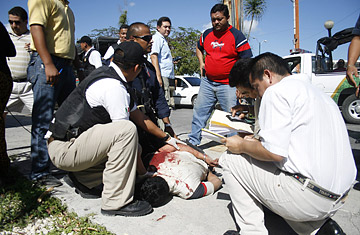
Policemen hold a suspected gunman who was injured after a shootout in Cancun, Mexico, January 12, 2008.
Juan Carlos Reyna had been driving a Jeep Liberty through Cancun's wealthiest neighborhood on a sweltering December afternoon when he was surrounded by three cars. A masked man bearing a Kalashnikov rifle leaned out of the car in front of him and shot Reyna in the head. Against all odds, the Cuban-American survived and was airlifted from Mexico's Caribbean resort to a U.S. hospital, where he is fighting for his life.
Others have been less fortunate. Since June, at least four Cuban-Americans, including Reyna's brother Maximiliano, have been shot dead on Cancun's glitzy boulevards in gangland-style hits. Mexican officials allege that these killings, and those of at least five Mexicans, stem from what they say is a turf war over lucrative human smuggling routes of Cubans via Mexico to the United States.
The blood being spilled in broad daylight in Mexico's most popular international tourist spot has raised the pressure on a police force already struggling against heavily armed drug cartels.
Senior Mexican officials blame the violence on Washington's "Wet Feet, Dry Feet" policy, in which Cubans caught at sea trying to enter the U.S. are turned back but those apprehended on U.S. soil after entering the country illegally are allowed to apply for asylum.
"This has to do with U.S. policy toward Cubans, that those who make it to [U.S.] territory by their own means can get automatic refugee status," Mexican Attorney General Eduardo Medina Mora said in a recent news conference. "People of Cuban origin who are citizens of the United States are involved, financing these people-smuggling operations, obviously with the complicity of Mexicans," he said.
Since the "Wet Feet, Dry Feet" policy was introduced in a 1995 revision to the U.S. Cuban Adjustment Act, smuggling networks taking Cubans from the communist-controlled island to Mexico's Caribbean coast have mushroomed.
Crossing the 130-mile stretch of sea in speedboats that can out-run Mexican navy vessels, the Cubans are kept in Cancun safe houses until relatives in the United States have paid the smugglers in full, according to Mexican investigations. The migrants then cross the U.S.-Mexico border by land or plane.
Mexico certainly appears to have become the most popular route for Cubans seeking to reach the United States. According to the U.S. Department of Homeland Security, 11,487 Cubans entered the U.S. over the Mexican border in the fiscal year 2007. Over the same period, 4,825 Cubans successfully crossed the Florida Straits, while 2,861 were caught by the Coast Guard and turned back.
A Mexican official not authorized to speak on the record explained that gangs running the lucrative Cuban smuggling route into the U.S. charge between $10,000 to $12,000 per head, compared to the $2,000 Mexicans pay "coyotes" to take them over the desert into the U.S. And it is the high profits have driven the killings, officials say, with rival groups allying with Mexican gangsters to fight over the spoils of the trade.
"We will have no cease-fire in the battle against organized crime," said Gov. Felix Gonzalez of Quintana Roo state, in announcing an increase in Cancun's police after the December shooting. "The security of residents and tourists is the priority of this government."
The Cuban government is also pressing Mexico to curb the smugglers. Cuba nabbed three Mexican fishermen heading to pick up migrants in 2006 and sentenced them to 10 years in prison. Throughout 2007, Mexican police rounded up growing numbers of undocumented Cuban migrants, sticking them in overcrowded detention centers near the Caribbean coast before they were deported to Havana or released.
In December, three Cubans protested poor conditions in one center by going on a hunger strike until they were hospitalized for dehydration. Many Mexicans, however, identify with the Cubans' desire to find a better life by sneaking over borders. A group of lawmakers, led by Rep. Fernel Galvez of the leftist Democratic Revolution Party, is lobbying for easing the treatment of Cubans and other Latin Americans caught on Mexican soil while heading for the United States.
"Even though our party shares a leftist ideology with Cuba, we have to respect these migrants' human rights. We are not in a position to call them traitors for leaving Cuba," said Galvez, who has three brothers working north of the border. "They are just looking for the American Dream like many Mexicans."
